跨文化交流英语intercultural communication
跨文化交际

所谓跨文化交际,即不同文化背景的人走到一起分享思想、感情和信息时所发生的一切。
跨文化交际的英语名是Intercultural Communication,早期也称为Cross-cultural Communication。
跨文化交际学最先在美国兴起。
美国是个移民国家,文化碰撞时有发生。
来自世界各地的移民都强调并维护自己的文化,因此形成了美国的多元文化格局。
于是跨文化交际引起了美国学者和各界人士的广泛关注。
日本也不甘落后,于1972 年在东京率先召开了第一届跨文化交际学国际研讨会,出席人数超过两千。
1974年,跨文化教育训练与研究学会(SIETAR,Society for Intercultural Education,Training and Research) 在美国正式宣布成立。
我国研究跨文化交际学起步较晚。
北京外国语大学著名语言学家胡文仲教授于80 年代初期开始从事跨文化交际学的研究,著作颇丰,目前已经编著出版了《跨文化交际学概论》、《跨文化与语言交际》等多部图书。
目前,跨文化交际学已发展成为一门被国际学者们充分重视的集人类学、语言学、心理学、传播学、社会学等为一体的综合性学科随着经济全球化的加快,新文化产生了。
正如你所说的“中西文化结合”,引用palen的话“这样也是一种文化”。
其实反过来想也是蛮有道理的--如果我们国家伟大文化跟不上时代的步伐,被淘汰掉也就不稀奇了。
我不明白很多人在急些什么(不是这儿的人),正如你所说的我们的前年文化可能在一朝一夕间就完全变成纯种的西方文化(说白了更多的是美国文化)吗?答案显然不可能。
但中西文化结合给与我们一个警示:如果我们没有捍卫我们认为有价值的文化的意识,那我们的文化就真的要灭亡了!说起我们同胞对西方“不三不四”认识的例子就太多了。
我本人在澳洲留学,上学期公车上碰到了2个来澳州培训英语的江苏的大学教师。
你说老师说话一般都是有凭有据的,说出来有一定的公信力吧。
跨文化交流的重要意义英语作文

跨文化交流的重要意义英语作文英文回答:Intercultural communication is a complex and challenging process, but it is also essential for understanding different cultures and building relationships between people from diverse backgrounds. Cross-cultural communication occurs when people from different cultures interact and exchange information, ideas, and experiences. These interactions can be verbal, nonverbal, or written, and they can take place in a variety of settings, such as the workplace, school, or social gatherings.There are many important benefits to cross-cultural communication. First, it can help people to learn about different cultures and perspectives. When people interact with people from other cultures, they learn about their values, beliefs, and customs. This knowledge can help people to become more tolerant and understanding of others, and it can also help to break down stereotypes andprejudices.Second, cross-cultural communication can help people to develop new skills and knowledge. When people interact with people from other cultures, they learn about new ways of thinking and doing things. This knowledge can be valuablein both personal and professional life. For example, people who work in international business need to have strong cross-cultural communication skills in order to be successful.Third, cross-cultural communication can help people to build relationships with people from other cultures. When people interact with people from other cultures, they build trust and understanding. These relationships can be valuable for both personal and professional reasons. For example, people who have friends from other cultures can learn about new cultures and perspectives, and they can also get help with things like finding a job or getting a visa.Of course, cross-cultural communication can also bechallenging. There are a number of barriers to cross-cultural communication, such as language barriers, cultural differences, and stereotypes. However, these barriers can be overcome with patience, understanding, and a willingness to learn.Here are some tips for effective cross-cultural communication:Be respectful of other cultures.Be aware of your own cultural biases.Listen actively to what others have to say.Be patient and understanding.Be willing to learn new things.With a little effort, anyone can learn to communicate effectively with people from other cultures. Cross-cultural communication is an essential skill for anyone who wants tolive and work in a globalized world.中文回答:跨文化交流是一个复杂且具有挑战性的过程,但对于理解不同文化并在具有不同背景的人们之间建立关系至关重要。
跨文化传播学关键术语解读

跨文化传播学关键术语解读跨文化传播学是研究不同文化之间的相互影响、交流和传播过程的学科。
在这个学科领域中,有一些关键术语是至关重要的,对于理解和解释跨文化传播现象具有重要意义。
下面将对其中几个关键术语进行解读,并提供相关参考内容。
1. 跨文化交流(intercultural communication):指不同文化之间的信息传递、理解和共享过程。
跨文化交流是解决文化差异问题和促进跨文化合作的重要手段。
参考内容:文化差异是跨文化交际的核心问题之一。
克里斯滕森(Christopher)指出,文化差异在跨文化交流中表现为语言和非语言差异、态度和价值观差异以及行为和礼仪差异。
在跨文化交际过程中,必须意识到并尊重对方的文化差异,同时培养跨文化沟通能力,以促进有效的交流和理解。
2. 文化霸权(cultural imperialism):指一个文化群体对其他弱势文化群体进行操控和影响的过程。
文化霸权常常伴随着经济、政治和军事力量的不平衡,在全球化的过程中比较常见。
参考内容:文化霸权是一个复杂的现象,常常存在于西方国家文化对其他国家的影响中。
尼尔(Neil)指出,文化霸权是一种意识形态的扩张,通过媒体、教育和商业等手段对其他文化进行塑造和影响。
反对文化霸权的观点认为,文化多样性是保护和发展每个国家独特文化的重要条件。
3. 文化认同(cultural identity):指一个人或群体对自己所属文化的认同感和归属感。
文化认同是个体和群体对自我身份的理解和建构的重要基础。
参考内容:文化认同是一个复杂的概念,常常与个体和社会的需求密切相关。
草本(Clayborne)指出,文化认同通过语言、价值观、习惯等方面的共同体验来建立,并在个体和群体的生活和行为中得以体现。
在跨文化传播中,理解和尊重他人的文化认同是建立和谐关系的重要前提。
4. 跨文化可信度(intercultural credibility):指在跨文化交流中,个体或群体在他人眼中符合期望、可靠可信的程度。
跨文化交际概念

跨文化交际概念“跨文化交际”的英语名称是“cross-cultural communication(或inter-cultural communication)”。
它指本族语者与非本族语者之间的交际,也指任何在语言和文化背景方面有差异的人们之间的交际。
通俗来说就是如果你和外国人打交道(由于存在语言和文化背景的差异),应该注意什么问题,应该如何得体地去交流。
从对外汉语专业的角度,“跨文化交际”的概念可以这样界定:在特定的交际情景中,具有不同的文化背景的交际者使用同一种语言(母语或目的语)进行的口语交际。
它包含以下几个要点:1.交际双方必须来自不同的文化背景文化背景的差异是一个宽泛的概念,既是指不同文化圈之间的差异,也是指同一文化圈内部亚文化之间的差异。
不过立足对外汉语专业,文化差异主要指不同文化圈之间的差异,尤其是中国和欧美国家的文化差异。
因为从跨文化交际的实际情形来看,由于文化背景的差异导致交际失误,容易引起冲突的主要是中国和欧美国家的人际交往。
中国同亚洲地区国家,如日本、韩国以及东南亚一些国家的人际交往,虽然也有文化差异的一面,但要顺利的多,这是因为这些国家与中国同属东方文化圈,彼此之间在文化取向和交际规范方面有很多相通的地方。
[1]2.交际双方必须使用同一种语言交际这是显而易见的,假如一方使用一种语言,而另一方使用另外一种不同的语言,交际是无法进行的。
但是,既然交际的双方来自不同的文化背景,又要使用同一种语言,那么用来交际的语言对一方来说是母语,而对另一方来说必然是第二语言(习得的“目的语”)。
比如一个中国人与一个美国人交谈,他们可以选择使用汉语,也可以选择使用英语,这样他们就可以用同一种语言直接交际,而不需要通过翻译这个中间环节。
这样界定的着眼点也是由对外汉语专业的特点决定的。
3.交际双方进行的是实时的口语交际跨文化交际的途径多种多样。
可以是语言符号的交际,也可以是非语言符号的交际,如商品、画报、实物、影像、演出到其他物化形式符号的交际;可以是现场的双向交际,也可以是通过媒介的单向交际,如电视、广播、报刊、广告等传播方式的交际;可以是口语交际,也可以是书面交际,如信函、公文等的来往。
跨文化交流的英语作文(通用7篇)

跨文化交流的英语作文跨文化交流的英语作文(通用7篇)在学习、工作乃至生活中,大家一定都接触过作文吧,作文是一种言语活动,具有高度的综合性和创造性。
那么问题来了,到底应如何写一篇优秀的作文呢?以下是小编整理的跨文化交流的英语作文,欢迎大家借鉴与参考,希望对大家有所帮助。
跨文化交流的英语作文篇1How to Make a Successful Intercultural Communication?With the development of global cooperation and frequent world-wide activities, people can't help involving in intercultural communications. However, due to the distinction of their cultural background, sense of worth and languages, it's uneasy to make the communication smooth and successful.There're several suggestions on how to make the intercultural communication carry the point. On the one hand, it's quite useful to learn some information on their culture, language and customs in advance, which will help you avoid embarrassment and miscomprehension while contacting others. For example, Japanese businessmen usually will behave more implicitly than Americans in the process of commercial negotiation. Knowing about this, you probably will negotiate with them in a different style. On the other hand, people should respect the customs of the opposing party and get rid of prejudice and stereotype. Of course, if your actions offend other people unwittingly, you'd better say apology and correct your behavior in time.A successful intercultural communication is not only beneficial to improve bilateral relations but also could enhance understanding between nations. So we should work together tomake it.跨文化交流的英语作文篇2There is no denying that the cultural exchanges are playing a more and more important role in the modern world.Firstly,let’s have a look at the picture. A foreign lady is XXX a traditional Chinese painting of bamboos. It seems that she is totally indulged in her painting. The picture shows that people from foreign countries are interested in our traditional Chinese culture. They not only appreciate the traditional Chinese paintings, music, costume, etc, but also begin to learn to how to make them. In this way,they hope to gain a better understanding of Chinese culture and thus can know the country better. Since our country became more open,our Chinese government has made great efforts to promote all kinds of exchanges with the outside world. These exchanges range from economics and education to culture. The cultural exchanges play a more and more important part in our life. Many channels are open for the foreigners to learn our traditional art. They can take some courses in some special schools and many professionals can be their teachers.In my opinion, the cultural exchange is good to all of us. It is an efficient way to introduce our Chinese culture to the world. In this way, people in the foreign countries can know more and more about China. Some biased views about our country can be dispelled.跨文化交流的`英语作文篇3Communication is the activity of conveying information through the exchange of thought, messages, or information. There are many communicating methods, such as speech, visuals, signals, writing or body languages.It plays an important role in social lives of human beings, which some people consider that it’s the basic of human existence.On the one hand, it’s the communication that spreads information, making us know the news although it’s far from us. By communicating with others, people send and get information that helps us know about our surroundings. We all know that information is extremely important in our lives. On the other hand, communication builds personal relationship, which connects different people together. We live in the same society which makes personal relationship essential in lives. Only with communication can we build and keep good personal relationships with others. In addition, communication can eliminate misunderstandings and promote emotions. When we have misunderstandings with others, timely communicating is the only effective way to solve it.In short, communication is essential to all people that everyone should realize that. Therefore, we should learn how to communicate with other effectively.跨文化交流的英语作文篇4The modern technology has greatly altered the mode ofcommunication among people. With the help of the Internet, people can easily contact each other anytime anywhere. However, the side effect is that many people have become over-dependent on the Internet and neglected face-to-face far as I'm concerned, electronic communication cannot fully replace the direct contact among people. Although it seems to bring everyone together, it actually estranges people and decreases the effectiveness of communication.A typical example is that, traditionally, people working in thesame office simply walk to others and talk. Today, however, co-workers tend to send e-mails or instant messages through the Internet even when they are sitting next to each other. As words can never convey the full message, it usually takes much more time and rounds of conversation than face-to-face communication, in which people can discuss more directly with less loss of conclude, the Internet enables more effective communication in some situations, but over-dependence on it actually pulls people apart.跨文化交流的英语作文篇5I have recently done a survey about how students find study partners.Some students find study partners through the Internet. They believe it’s convenient to find partne rs to study with online. Besides, they can get help from study partners whenever necessary. Some students prefer to join clubs to find study partners so that they can share experience face to face. What’s more, they think working out problems together helps learn more easily.As for me, I’d like to get study partners by going to summer camp because I can learn something new while having fun. Also, it’s a good way to learn how to get on well with others.跨文化交流的英语作文篇6Which is better for communication with your friends,writing letter or making a phone call?With the rapid development of technology,a growing number of electrical products appear and gradually gain their popularity.Recently there is a hot debate on the topic that which one is better for communication with your friends,writing letter or making a phone call?In my opinion,phone is a better way to communicate with others.Thereare some reasons accounting for my view.First of all,it is more convenient for us to call others.Mobile phone is small and light to carry with.Wherever and whenever you are,you can easily get touch with your friends if they are using the phone at the same time.While it takes much time when the letter arrives at your friends’.Once you have something urgent to tell them,it will be delayed.Second,the purpose of technological development is to meet people’s demand of pursing a better and more efficient life.If we all choose to write a letter,nothing will drive science and technology to make the progress.As a result of it,the society will st but not least,phone has more advantages over the amount of information and the consuming time.Even in terms of environmental protection,the paper of writing a letter comes from trees,which is opposite with the concept of friendly environment.All in all,I tend to make a phone call rather than writing a letter when communicating with others.跨文化交流的英语作文篇7it is common in english to ask people about their holidays. in the west many families go away on holiday during the summer months and so it is very usual to ask about this. if the holiday has not yet taken place,then their holiday plans can be talked about. and if it is already over,then where they went,whether they enjoyed it and so on can be discussed. similar questions are asked before festivals and pubic holidays.foreigners living and working in china often have frequent opportunities for travel,either at weekends or during their holiday periods,so questions on this topic can often lead to fruitful discussions. they may be particularly interested to hearcomments on which places are worth visiting and why,especially if these places are a little less well known and not clearly described in the tour guides.take vacaticn and long weekends. never let vacation time expire.。
新编跨文化交际英语教程 复习总结
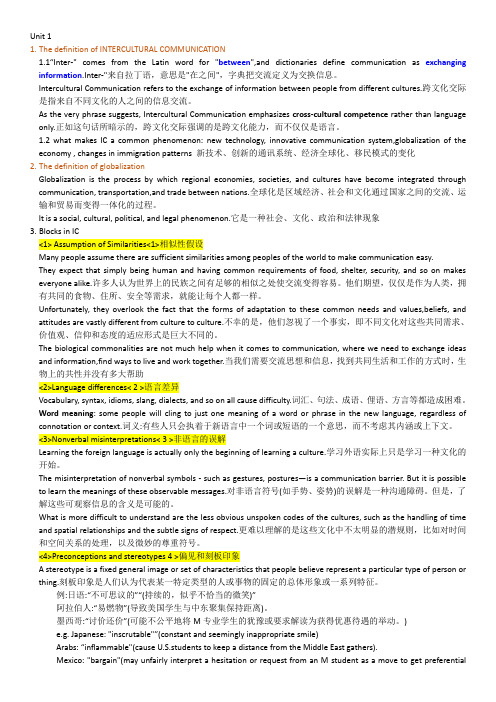
Unit 11.The definition of INTERCULTURAL COMMUNICATION1.1“Inter-" comes from the Latin word for "between",and dictionaries define communication as exchanging information.Inter-"来自拉丁语,意思是"在之间",字典把交流定义为交换信息。
Intercultural Communication refers to the exchange of information between people from different cultures.跨文化交际是指来自不同文化的人之间的信息交流。
As the very phrase suggests, Intercultural Communication emphasizes cross-cultural competence rather than language only.正如这句话所暗示的,跨文化交际强调的是跨文化能力,而不仅仅是语言。
1.2 what makes IC a common phenomenon: new technology, innovative communication system,globalization of the economy , changes in immigration patterns 新技术、创新的通讯系统、经济全球化、移民模式的变化2.The definition of globalizationGlobalization is the process by which regional economies, societies, and cultures have become integrated through communication, transportation,and trade between nations.全球化是区域经济、社会和文化通过国家之间的交流、运输和贸易而变得一体化的过程。
学习描述文化交流和交融的词汇
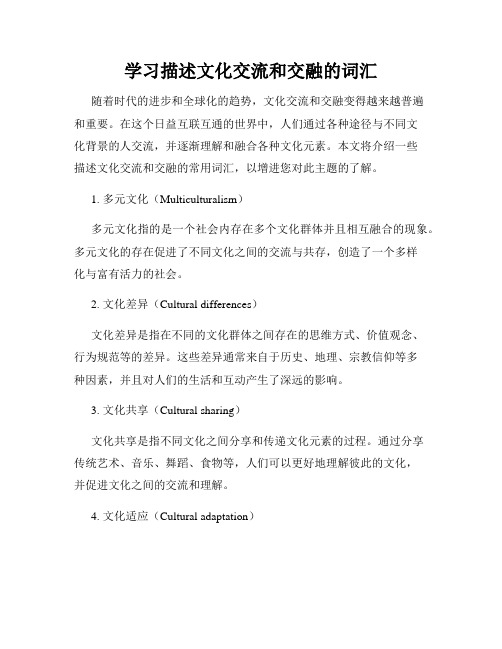
学习描述文化交流和交融的词汇随着时代的进步和全球化的趋势,文化交流和交融变得越来越普遍和重要。
在这个日益互联互通的世界中,人们通过各种途径与不同文化背景的人交流,并逐渐理解和融合各种文化元素。
本文将介绍一些描述文化交流和交融的常用词汇,以增进您对此主题的了解。
1. 多元文化(Multiculturalism)多元文化指的是一个社会内存在多个文化群体并且相互融合的现象。
多元文化的存在促进了不同文化之间的交流与共存,创造了一个多样化与富有活力的社会。
2. 文化差异(Cultural differences)文化差异是指在不同的文化群体之间存在的思维方式、价值观念、行为规范等的差异。
这些差异通常来自于历史、地理、宗教信仰等多种因素,并且对人们的生活和互动产生了深远的影响。
3. 文化共享(Cultural sharing)文化共享是指不同文化之间分享和传递文化元素的过程。
通过分享传统艺术、音乐、舞蹈、食物等,人们可以更好地理解彼此的文化,并促进文化之间的交流和理解。
4. 文化适应(Cultural adaptation)文化适应指的是一个个体或者群体在与不同文化相遇和互动时,逐渐接受、融入并适应新的文化环境的过程。
在文化交融中,积极的文化适应有助于人们更好地融入新的环境,并且增进跨文化交流。
5. 跨文化交流(Intercultural communication)跨文化交流是指来自不同文化背景的人们相互交流、分享信息和理解彼此的过程。
在跨文化交流中,人们面临着语言、习俗、信仰等方面的差异,而有效的跨文化交流能够帮助人们消除这些差异,建立和谐的关系。
6. 文化输出(Cultural export)文化输出是指一个国家或地区的文化通过各种方式传播到其他地区的过程。
通过文化输出,人们可以了解并欣赏其他国家的艺术、电影、音乐等,促进文化之间的交流与交融。
7. 文化认同(Cultural identity)文化认同是指个体或群体对自己所属文化的归属感与认同感。
跨文化交际icc的理解
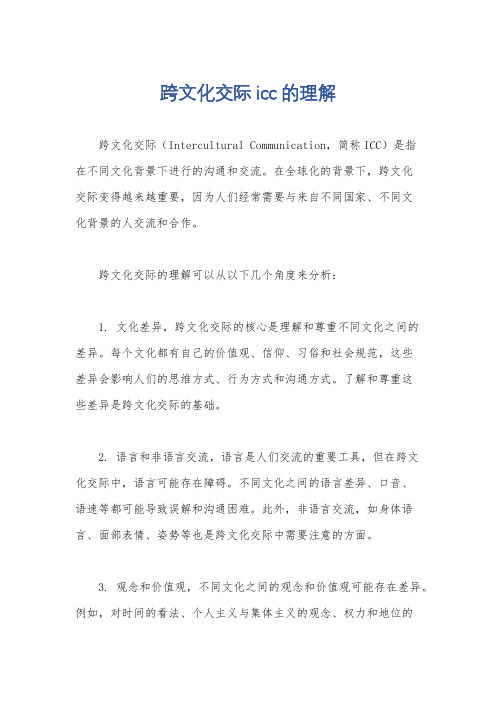
跨文化交际icc的理解跨文化交际(Intercultural Communication,简称ICC)是指在不同文化背景下进行的沟通和交流。
在全球化的背景下,跨文化交际变得越来越重要,因为人们经常需要与来自不同国家、不同文化背景的人交流和合作。
跨文化交际的理解可以从以下几个角度来分析:1. 文化差异,跨文化交际的核心是理解和尊重不同文化之间的差异。
每个文化都有自己的价值观、信仰、习俗和社会规范,这些差异会影响人们的思维方式、行为方式和沟通方式。
了解和尊重这些差异是跨文化交际的基础。
2. 语言和非语言交流,语言是人们交流的重要工具,但在跨文化交际中,语言可能存在障碍。
不同文化之间的语言差异、口音、语速等都可能导致误解和沟通困难。
此外,非语言交流,如身体语言、面部表情、姿势等也是跨文化交际中需要注意的方面。
3. 观念和价值观,不同文化之间的观念和价值观可能存在差异。
例如,对时间的看法、个人主义与集体主义的观念、权力和地位的认知等。
了解和尊重对方的观念和价值观,可以帮助建立良好的跨文化交际。
4. 文化敏感性,跨文化交际需要具备文化敏感性,即能够意识到自己的文化背景对交流的影响,并且尊重和适应对方的文化。
这包括对自己的文化偏见和刻板印象的认知,以及对不同文化之间的平等和互惠的态度。
5. 适应和灵活性,在跨文化交际中,适应和灵活性是非常重要的。
这意味着能够适应不同的沟通风格、礼仪习惯和社交规则,并且愿意调整自己的行为和语言,以更好地与对方进行交流。
6. 跨文化冲突解决,由于文化差异,跨文化交际中可能会出现冲突和误解。
解决跨文化冲突需要开放的心态、耐心和善意的沟通。
通过倾听、提问和解释,可以减少误解并找到共同的解决方案。
总而言之,跨文化交际是一种理解和尊重不同文化差异的沟通和交流方式。
它需要我们具备文化敏感性、适应能力和解决冲突的能力,以建立良好的跨文化关系。
通过有效的跨文化交际,我们可以促进文化交流、增进相互理解,并在全球化时代中实现更好的合作和发展。
跨文化交际的英语
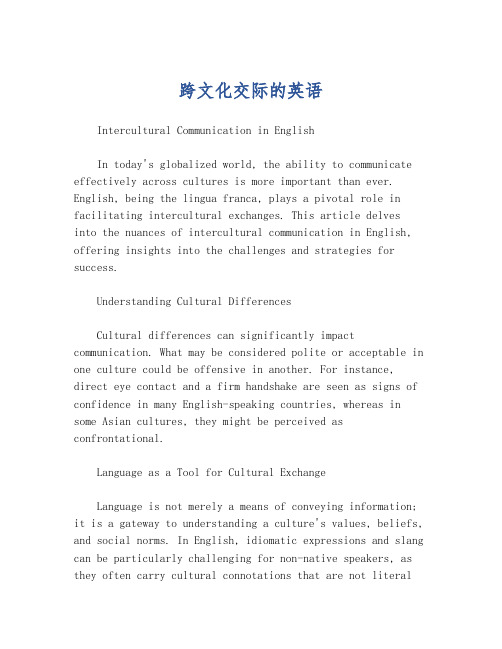
跨文化交际的英语Intercultural Communication in EnglishIn today's globalized world, the ability to communicate effectively across cultures is more important than ever. English, being the lingua franca, plays a pivotal role in facilitating intercultural exchanges. This article delvesinto the nuances of intercultural communication in English, offering insights into the challenges and strategies for success.Understanding Cultural DifferencesCultural differences can significantly impact communication. What may be considered polite or acceptable in one culture could be offensive in another. For instance, direct eye contact and a firm handshake are seen as signs of confidence in many English-speaking countries, whereas in some Asian cultures, they might be perceived as confrontational.Language as a Tool for Cultural ExchangeLanguage is not merely a means of conveying information; it is a gateway to understanding a culture's values, beliefs, and social norms. In English, idiomatic expressions and slang can be particularly challenging for non-native speakers, as they often carry cultural connotations that are not literaltranslations.Overcoming Communication BarriersTo overcome barriers in intercultural communication, it is essential to develop cultural awareness and sensitivity. This involves learning about the cultural background of your communication partners, being open to non-verbal cues, and adapting your communication style accordingly.Strategies for Effective Intercultural Communication1. Active Listening: Pay close attention to both verbal and non-verbal messages. This shows respect and helps in understanding the underlying cultural context.2. Cultural Adaptability: Be willing to adjust your communication style to match the cultural expectations of your audience.3. Clarification: When in doubt, ask for clarification to avoid misunderstandings.4. Patience and Tolerance: Recognize that cultural differences can lead to confusion or miscommunication and approach these situations with patience.5. Respect: Always show respect for the other person's culture, even if it differs from your own.The Role of Technology in Intercultural CommunicationWith the advent of technology, intercultural communication has become more accessible. Platforms like Skype, Zoom, and social media facilitate real-time interactions across geographical boundaries. However, the reliance on digital communication can sometimes lead to a lack of personal connection or increased potential for misinterpretation due to the absence of non-verbal cues.ConclusionIntercultural communication in English is a complex yet rewarding endeavor. By understanding cultural differences, being adaptable, and employing effective communication strategies, individuals can bridge cultural gaps and foster meaningful global relationships. As the world becomes increasingly interconnected, the importance of intercultural competence will only grow, making it a valuable skill for personal and professional success.。
跨文化交流的体验高中英语作文

跨文化交流的体验高中英语作文Title: The Experience of Intercultural CommunicationIntercultural communication is an essential part of our increasingly globalized world.It is a process that involves interacting and exchanging ideas with people from different cultural backgrounds.My personal experience in this regard was both enlightening and challenging.Last summer, I had the opportunity to participate in a student exchange program to Japan.It was a country I had always been fascinated by, and I was excited to explore its culture and traditions.However, I soon realized that there were many differences between our cultures, which made communication difficult at times.One of the main challenges I faced was the language barrier.Although I had studied Japanese for a few years, I found it difficult to communicate fluently with native speakers.This led to misunderstandings and confusion, as I often couldn't express myself properly or understand what others were saying.Another challenge was the difference in social norms and customs.In Japan, there is a strong emphasis on respecting hierarchy and showing politeness in every interaction.This was something I wasn't very familiar with, and I often found myself unintentionally violating these norms.For example, I would sometimes speak too loudly or joke around, which was considered disrespectful in Japanese culture.Despite these challenges, I tried my best to adapt and learn from my experiences.I participated in cultural activities and events, which helped me understand Japanese culture better.I also tried to learn the language by conversing with locals and watching Japanese movies.This not only improved my language skills but also helped me understand their culture more deeply.The most rewarding part of this experience was the friendships I formed with the Japanese students.Despite the language and cultural barriers, we found ways to communicate and connect with each other.We shared our traditions, food, and experiences, which brought us closer together.It was amazing to see how despite our differences, we were able to find common ground and build meaningful relationships.In conclusion, my experience of intercultural communication was challenging yet rewarding.It opened my eyes to the differences and similarities between cultures and taught me the importance of understanding and respecting others.It also showed me that despite the barriers, communication is possible if we are open to learning and embracing new experiences.。
跨文化交际的英文表达
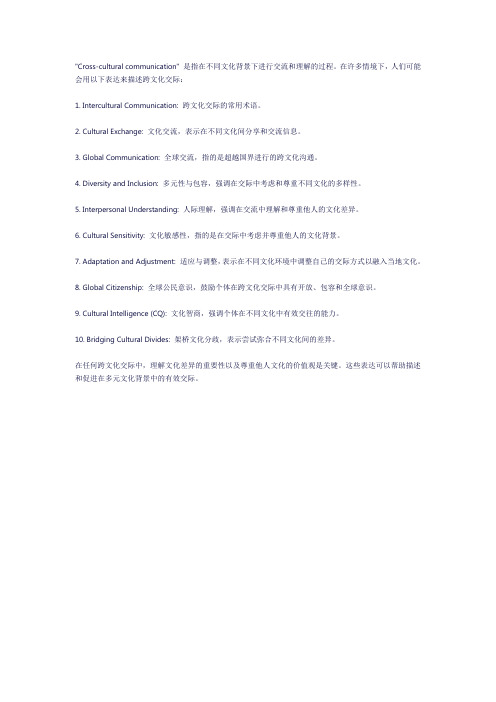
"Cross-cultural communication" 是指在不同文化背景下进行交流和理解的过程。
在许多情境下,人们可能会用以下表达来描述跨文化交际:
1. Intercultural Communication: 跨文化交际的常用术语。
2. Cultural Exchange: 文化交流,表示在不同文化间分享和交流信息。
3. Global Communication: 全球交流,指的是超越国界进行的跨文化沟通。
4. Diversity and Inclusion: 多元性与包容,强调在交际中考虑和尊重不同文化的多样性。
5. Interpersonal Understanding: 人际理解,强调在交流中理解和尊重他人的文化差异。
6. Cultural Sensitivity: 文化敏感性,指的是在交际中考虑并尊重他人的文化背景。
7. Adaptation and Adjustment: 适应与调整,表示在不同文化环境中调整自己的交际方式以融入当地文化。
8. Global Citizenship: 全球公民意识,鼓励个体在跨文化交际中具有开放、包容和全球意识。
9. Cultural Intelligence (CQ): 文化智商,强调个体在不同文化中有效交往的能力。
10. Bridging Cultural Divides: 架桥文化分歧,表示尝试弥合不同文化间的差异。
在任何跨文化交际中,理解文化差异的重要性以及尊重他人文化的价值观是关键。
这些表达可以帮助描述和促进在多元文化背景中的有效交际。
跨文化交际理解英语作文

跨文化交际理解英语作文英文回答:Intercultural communication, the exchange of information, ideas, and feelings between individuals from different cultural backgrounds, poses unique challenges and opportunities in the era of globalization. As the world becomes increasingly interconnected, individuals must develop intercultural competence, the ability to communicate effectively and respectfully across cultures.Effective intercultural communication requires an understanding of the cultural context of communication.This includes knowledge of cultural norms, values, beliefs, and communication styles. For example, in some cultures, it is considered polite to maintain eye contact while speaking, while in other cultures, it is considered disrespectful. By understanding the cultural context, communicators can avoid misunderstandings and build rapport.In addition to cultural understanding, effective intercultural communication also requires empathy and flexibility. Empathy is the ability to understand and share the feelings of others. By showing empathy, communicators can build trust and create a cooperative atmosphere. Flexibility is the ability to adapt one's communication style to the needs of the situation. For example, in a formal setting, it might be appropriate to use a more formal communication style, while in a casual setting, a more informal style might be more appropriate.Finally, effective intercultural communication requires a willingness to learn and grow. Individuals should be open to new experiences and perspectives, and they should be willing to challenge their own assumptions. By embracing the principles of effective intercultural communication, individuals can build strong relationships, foster understanding, and create a more just and equitable world.中文回答:跨文化交际是不同文化背景的个人之间信息、思想和情感的交流,在全球化的时代里带来了独特的挑战和机遇。
跨文化交际的意义英语作文
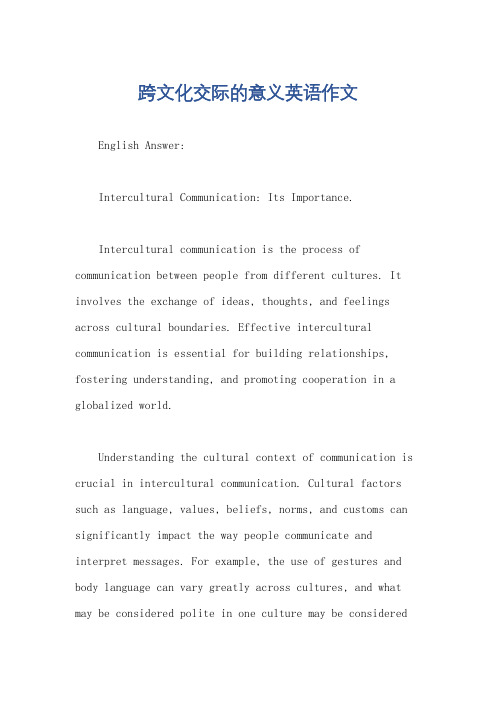
跨文化交际的意义英语作文English Answer:Intercultural Communication: Its Importance.Intercultural communication is the process of communication between people from different cultures. It involves the exchange of ideas, thoughts, and feelings across cultural boundaries. Effective intercultural communication is essential for building relationships, fostering understanding, and promoting cooperation in a globalized world.Understanding the cultural context of communication is crucial in intercultural communication. Cultural factors such as language, values, beliefs, norms, and customs can significantly impact the way people communicate and interpret messages. For example, the use of gestures and body language can vary greatly across cultures, and what may be considered polite in one culture may be consideredrude in another.To communicate effectively across cultures, it is important to be aware of cultural differences and to adapt communication styles accordingly. This includes being respectful of cultural norms, being mindful of language barriers, and using clear and concise language. It is also important to be open-minded and willing to learn about other cultures.Effective intercultural communication can bring numerous benefits. It can:Build relationships: By understanding and respecting cultural differences, people can build stronger relationships with individuals from other cultures.Foster understanding: Intercultural communication can help people develop a deeper understanding of different cultures and perspectives, leading to greater empathy and tolerance.Promote cooperation: By breaking down cultural barriers, intercultural communication can facilitate cooperation between people from different backgrounds, leading to positive outcomes in various fields such as business, diplomacy, and education.In a globalized world, intercultural communication is more important than ever before. By embracing cultural diversity and fostering effective intercultural communication, individuals and organizations can create a more inclusive and harmonious society.中文回答:跨文化交流的重要性。
跨文化交流Intercultural Communication
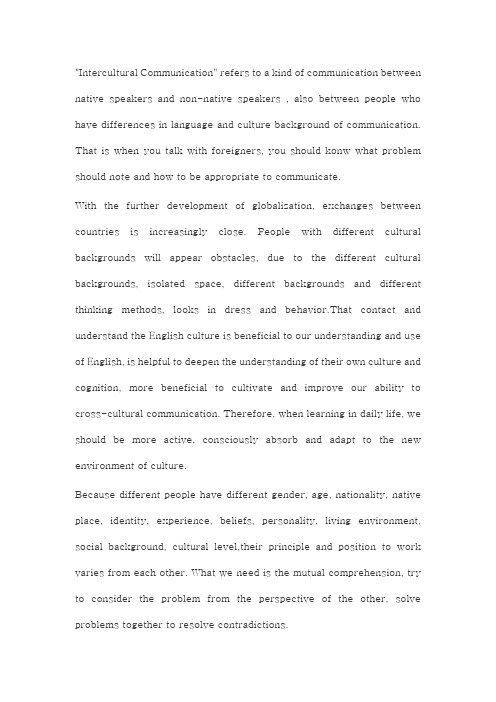
"Intercultural Communication" refers to a kind of communication between native speakers and non-native speakers , also between people who have differences in language and culture background of communication. That is when you talk with foreigners, you should konw what problem should note and how to be appropriate to communicate.With the further development of globalization, exchanges between countries is increasingly close. People with different cultural backgrounds will appear obstacles, due to the different cultural backgrounds, isolated space, different backgrounds and different thinking methods, looks in dress and behavior.That contact and understand the English culture is beneficial to our understanding and use of English, is helpful to deepen the understanding of their own culture and cognition, more beneficial to cultivate and improve our ability to cross-cultural communication. Therefore, when learning in daily life, we should be more active, consciously absorb and adapt to the new environment of culture.Because different people have different gender, age, nationality, native place, identity, experience, beliefs, personality, living environment, social background, cultural level,their principle and position to work varies from each other. What we need is the mutual comprehension, try to consider the problem from the perspective of the other, solve problems together to resolve contradictions.Chinese culture is based on Confucianism and Confucian thought is the basic cultural beliefs in East asia. While western culture originated in Greece and Rome, the source of western culture in Greek is rationalism and art, Renaissance, religious reform, the scientific revolution, the enlightenment is the motive force of the development of Western culture. Rationalism emphasizes scientific test, pay attention to the form of argument. The Anglo American countries, people pay more attention to the exact nature of the expression, it is difficult to understand the implication of the Chinese. For example, in Chinese culture, red represents luck, wealth and happiness, while Westerners concept, red is the color of blood, that impulse, provocation. So, Chinese like to wear red clothes in festivals, while the Westerners tend to choose blue, because they feel that blue represents calm and composure.。
什么是跨文化交际英语回答
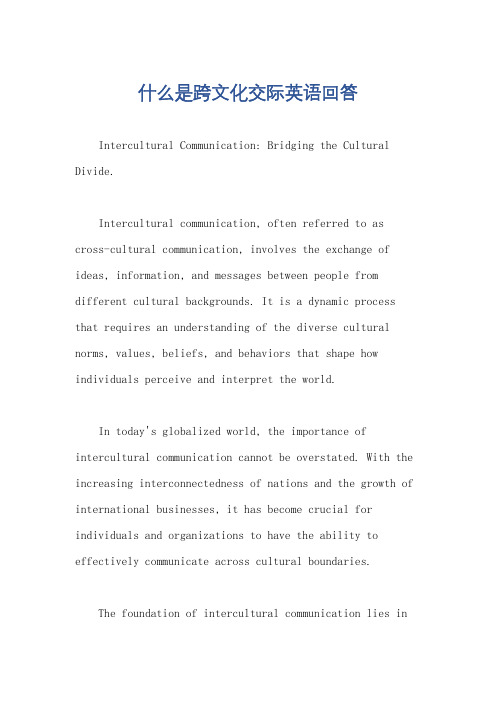
什么是跨文化交际英语回答Intercultural Communication: Bridging the Cultural Divide.Intercultural communication, often referred to as cross-cultural communication, involves the exchange of ideas, information, and messages between people from different cultural backgrounds. It is a dynamic process that requires an understanding of the diverse cultural norms, values, beliefs, and behaviors that shape how individuals perceive and interpret the world.In today's globalized world, the importance of intercultural communication cannot be overstated. With the increasing interconnectedness of nations and the growth of international businesses, it has become crucial for individuals and organizations to have the ability to effectively communicate across cultural boundaries.The foundation of intercultural communication lies inthe recognition that culture plays a pivotal role inshaping an individual's communication style, language use, and social norms. Culture encompasses a wide range of elements, including but not limited to traditions, customs, values, beliefs, art, music, and food. Each culture has its unique way of viewing the world and interpreting situations, which can lead to misunderstandings and conflicts when individuals from different cultures interact.To ensure successful intercultural communication, it is essential to develop a cultural awareness and sensitivity. This involves understanding the values and norms of other cultures, recognizing the differences in communication styles, and appreciating the unique perspectives that different cultures bring. By doing so, individuals canavoid cultural mishaps, such as misinterpreting nonverbal cues or violating social taboos, which can lead to misunderstandings and conflicts.Effective intercultural communication also requires the ability to adapt and flexibly communicate in different cultural contexts. This involves being able to adjust one'scommunication style, language use, and behavioral norms to fit the cultural norms of the other party. For example, in some cultures, directness and assertiveness are valued, while in others, a more indirect and polite approach is preferred. By adapting one's communication style to the cultural context, individuals can establish trust, build rapport, and foster meaningful relationships.Moreover, intercultural communication goes beyond simple language translation. It involves understanding the deeper cultural meanings and implications behind the words and actions of others. This requires a high level of empathy and the ability to put oneself in the shoes of the other party, understanding their perspectives, needs, and expectations. By doing so, individuals can create a more inclusive and respectful communication environment where everyone's voice is heard and valued.In conclusion, intercultural communication is a crucial skill in today's globalized world. It requires an understanding of the diverse cultural norms, values, beliefs, and behaviors that shape how individuals perceiveand interpret the world. By developing a cultural awareness and sensitivity, adapting one's communication style to different cultural contexts, and fostering empathy and respect, individuals and organizations can bridge the cultural divide and create meaningful connections across the globe.。
大学英语跨文化交际chapter5 Intercultural Communicationppt课件

Text A Significance of Verbal Communication
Personal / Contextual
Instrumental / Affective
Dialect and Sociolect
Pidgin and Lingua Franca
Taboo and Euphemism
jargon
Direct Plan
Indirect Plan
Chapter 5 Verbal Intercultural Communication
Eg. In the Amazon area snow is not a part of the environment; therefore, people in that region do not have a word for snow.
Most Americans use terms such as snow, powder snow, sleet, slush, blizzard, and ice.
Navajo do not have the differentiated vocabulary connected with time and clocks.
One of the problems in dealing with people from other cultures is that we translate concepts from a foreign language and culture with words that fit our expectations. Eg. For Americans “tomorrow” means midnight to
- 1、下载文档前请自行甄别文档内容的完整性,平台不提供额外的编辑、内容补充、找答案等附加服务。
- 2、"仅部分预览"的文档,不可在线预览部分如存在完整性等问题,可反馈申请退款(可完整预览的文档不适用该条件!)。
- 3、如文档侵犯您的权益,请联系客服反馈,我们会尽快为您处理(人工客服工作时间:9:00-18:30)。
Intercultural communications are essential in the era ofglobalizationHUKai-jun,NO.M060113103(Shanghai University Of Engineering Science,Automotive engineering,Shanghai201620)With the rapid development of our modern society,more and more people come to attach a great importance to intercultural communication,especially in the era of globalization.It is not only in china but also all over the world.But what is the definition of intercultural communication?It refers to the communication between different cultural backgrounds.If you talk with your American teacher,intercultural communication takes place.Culture is notoriously difficult to define. In1952,the American anthropologists,Kroeber and Kluckhohn,critically reviewed concepts and definitions of culture,and compiled a list of164different definitions.Apte(1994:2001), writing in the ten-volume Encyclopedia of Language and Linguistics,summarizes the problem as follows:‗Despite a century of efforts to define culture adequately,there was in the early1990s no agreement among anthropologists regarding its nature.‘Despite these problems,I propose the following definition:Culture is a fuzzy set of attitudes, beliefs,behavioral conventions,and basic assumptions and values that are shared by a group of people,and that influence each member‘s behavior and each member‘s interpretations of the‗meaning‘of other people‘s behavior.This definition draws attention to a number of issues.Firstly,culture is manifested at different layers of depth, ranging from inner core basic assumptions and values,through outer core attitudes,beliefs and social conventions,to surface-level behavioral manifestations.Personally I thingk Culture is what we share with some but not with all other people;it is common to people belonging to a certain group or category,but different from people belonging to other groups or categories.In our life,culture is everywhere and determines how we usually behave.It includes the language in which we express ourselves,the way we raise our children,the deference we show to our elders,the physical distance from other people we maintain in order to feel comfortable,and the way we perceive general human activities such as eating,making love,having a conversation,forming a friendship with someone,etc.and the ceremonials surrounding them.I ntercultural communication is not new.It has existed as long as people from different cultures have been encountering one another. As intercultural contacts have increased both here and abroad,people have accepted that cultural diversity has become a fact of life. Only during the last30years,however,have people begun a serious and systematic study of exactly what happens during intercultural contacts.They now want to know how cultural diversity is reflected when people come together,when the communication process involves people from different cultures.Perhaps the initial impetus for the study of intercultural communication was the recognition that technology has produced the means for humankind‘s self-destruction.Historically, intercultural communication,more often than not,has employed a rhetoric of force ratherthan reason.But with agents of change sweeping the world,perhaps people are now seeking interaction through communication rather than traditional force.The reason for this new study is also pragmatic.Our mobility, increased contact among cultures,a global marketplace,and the emergence of multicultural organizations and workforces require the development of communication skills and abilities that are appropriate to a multicultural society and to life in a global village.Traditionally,intercultural communication took place only among an extremely small portion of the world‘s populace.Ministers of state and government,certain merchants, missionaries,explorers,and a few tourists were the primary travelers and visitors to foreign lands.Until rather recently,as Americans you had little contact with other cultures,even within your own country.Members of nonwhite races were segregated.Only in recent years have laws changed to foster integrated schools,workforces,and,to some extent, neighborhoods.In addition,those who made up the vast,white,middle Euro-America remained at home,rarely leaving their own county.This situation,of course,has changed markedly; America is now a mobile society among other increasingly mobile societies.This increased contact with other cultures and domestic co-cultures makes it imperative that you make a concerted effort to understand and get along with people who may be significantly different from you.Your ability,through increased awareness and understanding,to coexist peacefully with people who do not necessarily share your backgrounds,views,beliefs, values,customs,habits,or lifestyles can benefit you in your own neighborhoods and can be a decisive factor in forestalling international conflict.But do you know Intercultural communications are essential in the era of globalization.The following factors and reasons may account for it.Above all.culture is prevalence and has a profound effect on humans.Culture is also invisible yet pervasive. As we go about our daily lives,we do not have a great sense of our culture’s influence.Culture exist everywhere around us between different nations even different countries.Culture has a direct influence on the physical,relational and perceptual environment.Yet most of our thoughts,emotions,and behaviors are profoundly affected by different cultures.In addition to the rapid growth of modern society,People have more and more exchanges, the importance of intercultural communication is becoming more important.Intercultural communication occurs whenever a minimum of two persons from different cultures or countries come together and exchange verbal and nonverbal symbols.It can occurs everywhere. For example,When we do business with people from different cultures or different countries, we need to communicate with them,we need exchange different views about the business on the matter of information.A main theme throughout this text is that intercultural communication is indispensable.But why intercultural communications are so common in our globalization?The following factors an reasons may account for it.Above all, mobile means of transport.Now jet planes fly everywhere.It used to take months to travel from Shanghai to Los Angeles,but now it takes only12hours.It is now much easier for people to move from one country to another.People of different countries and races get together much oftener than before.moreover,people get in touch with each other in various ways, including the internet,the telephone,the satellite,etc.So sophisticated communication systems have also helped to increase intercultural communication.Besides,there is globalization of world economy.This means multi-national companies now operate in many countries in the world.They employ people of different ethnic groups and of differentcountries.Actually,some multi-national companies make a point of employing people of different countries.They don’t use people from just one country.Because their company is the multi-national company and they want to use people from different countries.And finally there is mass lions of people now move across national borders every year.So all these contributes to the fact that intercultural communication is now a daily occurrence and are essential in the era of globalization.Its importance now is being recognized by an increasing number of people.。
